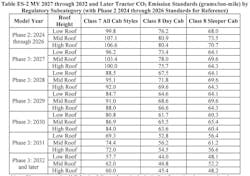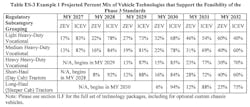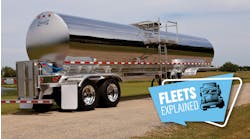The American Petroleum Institute has filed a lawsuit against the U.S. Environmental Protection Agency’s latest heavy-duty vehicle emissions standards.
With multiple co-petitioners, including the Owner-Operator Independent Drivers Association, API filed the lawsuit in the D.C. Circuit Court of Appeals on Tuesday, June 18.
“Today, we are standing up for consumers who rely on trucks to deliver the goods they use every single day,” Ryan Meyers, API SVP and general counsel, said in a press release. “The EPA is forcing a switch to technology that simply does not presently exist for these kinds of vehicles—and even if it were someday possible, it will almost certainly have consequences for your average American.”
API is the largest oil trade group in the U.S., representing more than 500 corporations in the petroleum industry. The Institute includes industry heavy hitters Exxon Mobil and Chevron.
“Small-business truckers make up 96% of trucking and could be regulated out of existence if the EPA’s unworkable heavy-duty rule comes into effect,” said Todd Spencer, OOIDA president. “This rule would devastate the reliability of America’s supply chain and ultimately increase costs for consumers. Mom-and-pop trucking businesses would be suffocated by the sheer cost and operational challenges of effectively mandating zero-emission trucks, but this administration appears intent on forcing through its deluge of misguided environmental mandates.”
About the EPA emissions standards
EPA’s Greenhouse Gas Emissions Standards for Heavy-Duty Vehicles—Phase 3 introduces more stringent engine-out greenhouse gas emissions for manufacturers, beginning with model year 2027 and ending with 2032.
EPA finalized the rule on March 29, with emissions standards applicable to new heavy-duty vocational vehicles, including tractor-trailer trucks, delivery trucks, school buses, and more.
The emissions standards for a high roof Class 8 sleeper cab, for example, would drop from 70.7 grams per ton-mile for MY2024 to 64.3 for MY2027. By model year 2032, the end of GHG3’s timeline, the cab’s emissions standards would drop as low as 48.2 grams per ton-mile.
The standards do not mandate EV production. OEMs can employ a wide array of emissions-reducing technologies, including aerodynamics improvements or alternative fuel propulsion systems. However, EPA expects as many as 25% of long-haul sleeper cab tractors to be zero-emission vehicles by 2032.
OEMs will be permitted to make internal combustion engine vehicles that comply with MY2027 emissions standards through powertrain and aftertreatment system improvements. However, industry experts anticipate these newly compliant vehicles will cost $25,000 more.
Trucking association responses have criticized the GHG3 rule, including the American Trucking Associations, Clean Freight Coalition, and OOIDA. Critics have pointed out the increased operational costs of the new regulations and a continued lack of available ZEV infrastructure.






